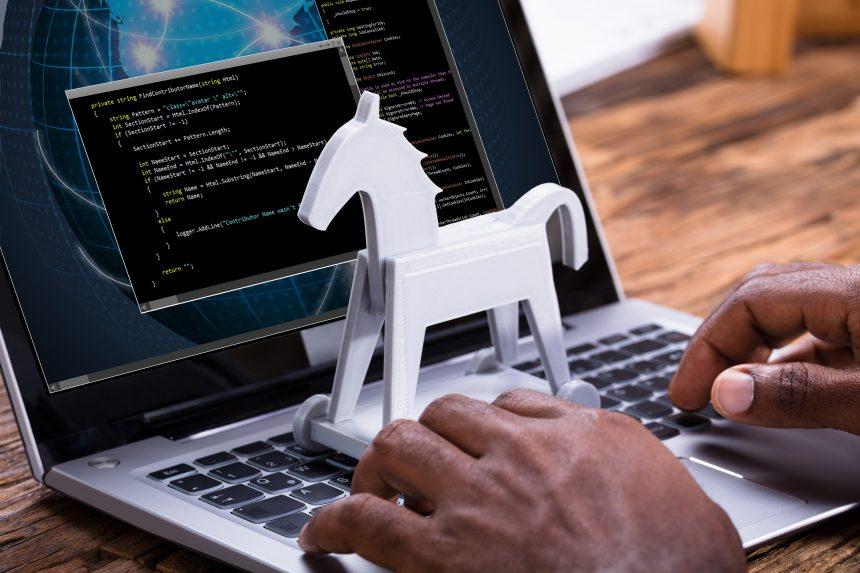Trojan horses, commonly referred to as “Trojans,” are a deceptive and dangerous form of malware. Unlike traditional viruses, Trojans masquerade as legitimate files or programs to trick users into allowing them onto their systems. Named after the ancient Greek tale of the Trojan Horse, this type of malware operates stealthily, hiding within seemingly innocent applications, files, or attachments. Once active, Trojans can grant unauthorized access to attackers, allowing them to steal sensitive data, install further malicious programs, or exploit system vulnerabilities.
Remove annoying malware threats like this one in seconds!
Scan Your Computer for Free with Spyhunter
Download Spyhunter now, and scan your computer for this and other cybersecurity threats for free now!
Overview of Trojan Downloader: PowerShell/MalScript.MSR
One particularly dangerous Trojan variant is the Trojan Downloader: PowerShell/MalScript.MSR. This Trojan downloader is designed to penetrate a system and then download additional malicious components. Using PowerShell, it executes commands on the compromised system, allowing attackers to gain more control and increase their attack potential.
How It Works
Trojan Downloader: PowerShell/MalScript.MSR typically infiltrates systems through email attachments, malicious links, or untrustworthy software downloads. Once downloaded and opened, it installs itself using PowerShell commands, leveraging this scripting language to bypass some security mechanisms. Its primary function is to download and install other malicious software, often without the user’s knowledge, creating multiple layers of malware that can drain resources, steal information, or even provide remote access to hackers.
Actions Performed After Installation
After installation, Trojan Downloader: PowerShell/MalScript.MSR connects to a remote server controlled by cybercriminals, from which it retrieves further malware payloads. The malware downloaded may include spyware, ransomware, or adware, each carrying its own destructive purpose. As a result, infected systems can experience performance issues, data loss, or theft of sensitive information.
Consequences of Infection
The presence of Trojan Downloader: PowerShell/MalScript.MSR can have significant repercussions, including:
- Data Theft: Cybercriminals may gain access to personal files, account credentials, and financial information.
- System Performance Issues: The malware consumes system resources, causing programs to slow down or crash.
- Privacy Risks: Remote access enables unauthorized individuals to monitor activity on the infected system.
- Potential Financial Losses: With downloaded ransomware or spyware, users may face ransom demands or financial fraud.
Symptoms of Trojan Downloader: PowerShell/MalScript.MSR Infection
If your computer is infected with this Trojan, you may observe some of the following symptoms:
- Unusually slow system performance and frequent crashes.
- Unauthorized programs or applications appearing on the system.
- An increase in pop-ups or advertisements.
- Browser redirects to unfamiliar websites.
- System settings or security settings being altered without consent.
Detection Names for Trojan Downloader: PowerShell/MalScript.MSR
Several anti-malware tools may identify this malware under different names. Some common detection names include:
- TrojanDownloader: PowerShell/MalScript.MSR
- PowerShell/TrojanDownloader.Agent
- Trojan.PS1.Agent
- MaliciousPowerShellScript.Downloader
- TrojanDownloader:PowerShell
If your anti-malware software identifies any of these detection names, your system may be infected with this Trojan or a similar variant.
Similar Threats to Be Aware Of
Other similar Trojans that may operate similarly to PowerShell/MalScript.MSR include:
- TrojanDownloader:Win32/Trickbot: Another downloader that installs various malware types, including banking Trojans.
- Trojan:Win32/MaliciousScript: This Trojan also uses scripts to install further malware.
- PowerShell/Downloader.Agent: A malware variant that utilizes PowerShell to download additional harmful components.
Comprehensive Removal Guide for Trojan Downloader: PowerShell/MalScript.MSR
To remove Trojan Downloader: PowerShell/MalScript.MSR, follow these detailed steps carefully.
Remove annoying malware threats like this one in seconds!
Scan Your Computer for Free with Spyhunter
Download Spyhunter now, and scan your computer for this and other cybersecurity threats for free now!
Step 1: Disconnect from the Internet
To prevent further data transfer between the Trojan and its remote server, disconnect your device from the internet.
Step 2: Boot into Safe Mode
Safe Mode disables many background processes, making it easier to remove malware.
- Windows 10/11: Go to Settings > Update & Security > Recovery. Under Advanced Startup, click Restart Now.
- Select Safe Mode with Networking to allow any necessary software updates.
Step 3: Uninstall Suspicious Programs
- Press Windows + R, type
appwiz.cpl, and press Enter. - In the list of programs, look for any unknown or suspicious entries. Right-click and choose Uninstall.
Step 4: Check for Unwanted Browser Extensions
- Chrome: Go to Settings > Extensions and disable/delete unknown extensions.
- Firefox: Click on the menu icon, go to Add-ons > Extensions, and remove unfamiliar ones.
Step 5: Use Anti-Malware Software
Install a reliable anti-malware tool like SpyHunter.
- SpyHunter will scan your system, identifying any traces of the Trojan and related files.
- Run a full system scan and follow the instructions to remove detected threats.
Step 6: Delete Temporary Files
- Press Windows + R, type
%temp%, and press Enter. - Delete all files in this folder. These are temporary files that malware often uses.
Step 7: Reset Your Web Browser
This step is necessary if the Trojan altered your browser settings.
- Chrome: Go to Settings > Reset and clean up > Restore settings to their original defaults.
- Firefox: Go to Help > Troubleshooting Information > Refresh Firefox.
Step 8: Restart Your Computer
After following these steps, restart your computer to complete the removal process.
Further Actions to Prevent Future Infections
Taking proactive measures can significantly reduce the risk of future malware infections.
- Avoid Unknown Links and Attachments: Be cautious with emails from unknown senders, especially with attachments or links.
- Use Anti-Malware Software: Tools like SpyHunter offer real-time protection and periodic scans to identify new threats.
- Regularly Update Software: Update your operating system and software frequently to patch known vulnerabilities.
- Enable Firewalls: A firewall helps block suspicious traffic and prevent unauthorized access to your network.
- Backup Important Data: Routinely back up data to an external source, so you are prepared if malware compromises your system.
By following these preventive steps, you can strengthen your system’s defenses against malicious programs.
Recommended Tool for Protection and Removal
For thorough protection against Trojans like PowerShell/MalScript.MSR, consider installing SpyHunter. SpyHunter’s real-time scanning and malware detection capabilities can identify, quarantine, and remove threats to your system. Download SpyHunter to scan your computer for free and enjoy an added layer of security.





